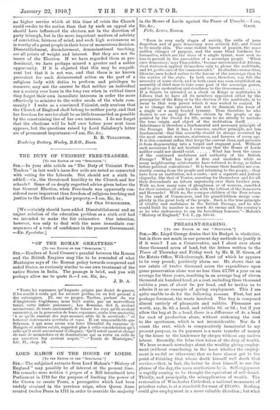LORD MAHON ON THE HOUSE OF LORDS.
[TO THE EDITOR OF THE "SPECTATOR."] SIR,—The subjoined extracts from Lord Mahon's "History of England " may possibly be of interest at the present time. His remarks were written a propos of a Bill introduced into Parliament in 1719 for the purpose of limiting the power of the Crown to create Peers, a prerogative which had been unduly strained in the previous reign, when Queen Anne created twelve Peers in 1711 in order to override the majority
in the House of Lords against the Peace of Utrecht.—I ant,
"Even in very early stages of society, the evils of pure despotism and of pure democracy were severely felt, and found to be nearly akin. The same violent bursts of passion, the same sudden changes of purpose, and the same blind fondness for favourites, which are the vices of a single tyrant, were seen no less to prevail in the assemblies of a sovereign people. When once democracy,' says Thucydides, `became unrestrained at Athens, rival statesmen applied themselves only to please the multitude, and let go the care of the commonwealth.' In absolute monarchies, likewise, men looked rather to the favour of the sovereign than to the service of the state. In both cases, therefore, was felt tho necessity of some check, and in both cases was soon established an assembly of chief men to take some part of the sovereign power,
and to give moderation and steadiness to the Government If a Senate be intended as a check on Kings or multitudes it follows that to have all its members appointed either by the prerogative of the King or by the election of the multitude, is to recur to that very power which it was wished to control. It is to change the operation but not to diminish the force of a single or a many headed tyranny. Thus therefore he who desires to see an Upper House chosen by the people or ap- pointed by the Crown for life, seems to me utterly to mistake the true origin and object of the institution itself Inheritance is therefore a fundamental and necessary principle of the Peerage. But it has, I conceive, another principle, not less fundamental—that this assembly should be always recruited by the most eminent warriors, statesmen, and lawyers of every age. It is this constant influx that keeps the current clear, and prevents it from degenerating into a torpid and stagnant pool. Without such accessions I do not hesitate to say that the House of Lords
neither could nor should exist What has been the cause of the continued usefulness and authority of the British Peerage? What has kept it firm and unshaken while so many neighbouring aristocracies have tottered to decay, or fallen before political convulsions ? It is because their families are con- stantly coming from the people and returning to the people,—they have been an institution, not a caste,—not a separate and jealous oligarchy, like that of Venice, asserting for themselves and for all their descendants an inborn superiority over their brother men. With us, how many sons of ploughmen or of weavers, ennobled for their services, sit side by side with the loftiest of the Somerseta and Howards ? With us, the younger children of the Peer return to the rank of Commoners, and his grandchildren merge com- pletely in the great body of the people. Such is the true principle of vitality and usefulness in the British Peerage, and he who would limit its number is as much its enemy and the country's as he who endeavours to sap its hereditary honours."—Mahon's "History of England," Vol. I., pp. 535-41.






































 Previous page
Previous page